Key Takeaways
- The average respondent who prioritized academics in college earned approximately $10,000 more annually than respondents who prioritized their personal life.
- Respondents who prioritized an in-demand field over an enjoyable field earned almost $10,000 more annually.
- Respondents who prioritized partying in college have the highest average annual salary.
- Respondents who prioritized learning to be independent while in college were highly likely to be satisfied with their lives.
- Networking and having responsibility are the career priorities correlated with the highest career satisfaction.
- Avoiding stress at work is correlated with the lowest life and career satisfaction.
- Respondents who prioritize an enjoyable career earn less than those who prioritize earnings, but are happier with their lives.
When Americans reflect on their college experiences, their descriptions differ widely. Some recount late nights in the library, while others recall wild fraternity parties. Whereas some pursue a single subject with passion, others sample the whole course catalogue. Simply put, there’s no college playbook: You can shape the experience as you see fit.
But how do our priorities in college prepare us for life later? After all, one might assume that being focused in school would pay dividends in professional life. Do driven college students eventually earn more than those who prioritize partying? Do people who study subjects they love find more fulfilling careers?
We surveyed over 1,000 former college students about their attitudes and priorities when they were at school. We then asked about their current careers, including how satisfied they were and how much they earned. Our findings reveal interesting connections between experiences in college and the world of work – and plenty of surprises about the origins of success. To see what we uncovered, keep reading.
Which Trade-Offs Pay Off?
Before you ever arrive on campus, college demands difficult choices. From picking a school to selecting a major, simply beginning your studies involves several tough trade-offs. Then once you do arrive, you face more decisions about how to spend your time.
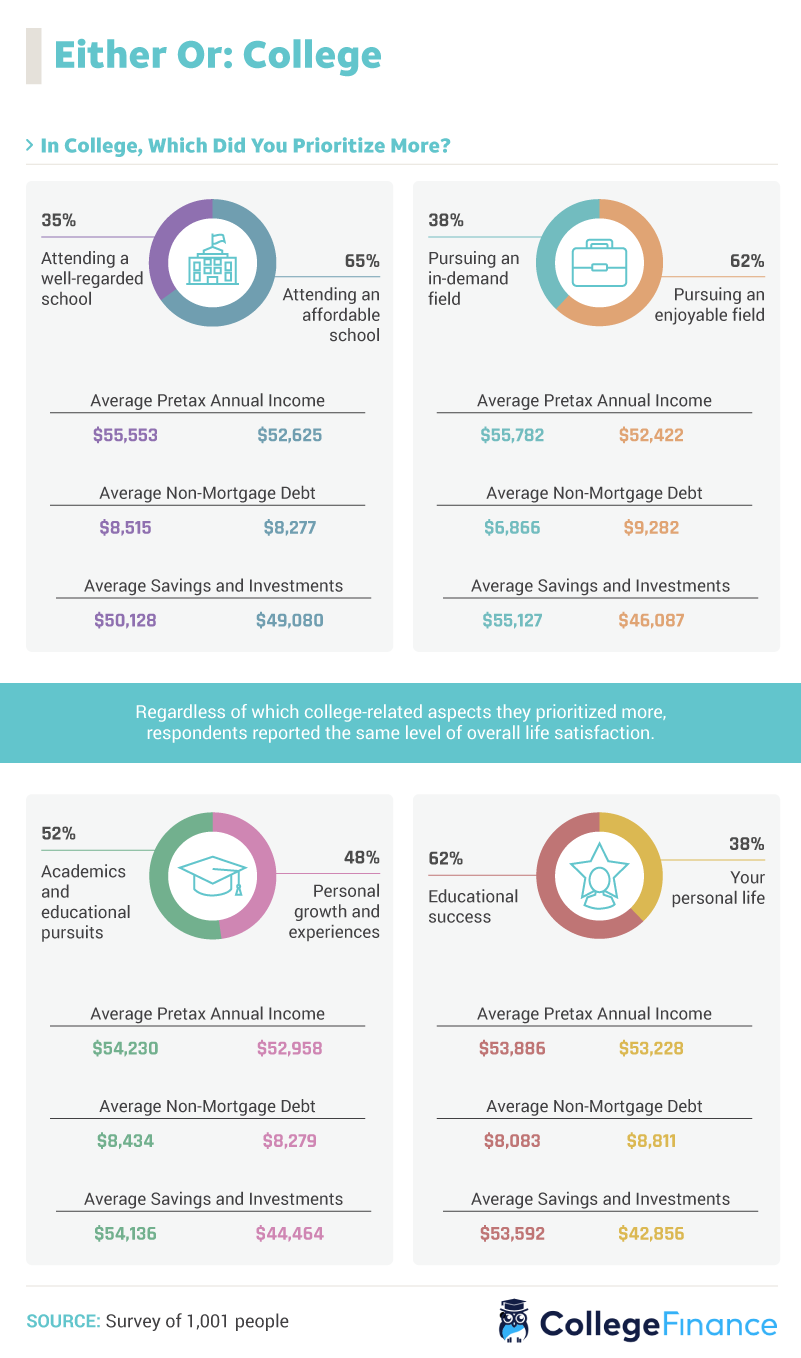
In selecting a college, nearly two-thirds of respondents said they prioritized attending an affordable school over one with an impressive reputation. This calculus may be prudent in the short term, but some research indicates that attending an elite private school is a sound long-term investment. Indeed, those who prioritized reputation earned slightly more on average, and their savings and debts were similar to those who prioritized affordability.
The choice to pursue an in-demand field seemed financially savvy in retrospect: This cohort had impressive financial statistics relative to those who studied an enjoyable subject. Many such majors are difficult and technical but guarantee financial stability almost immediately upon graduation.
An achievement-oriented approach to college also seemed to yield other financial benefits. People who prioritized academics over their personal growth and experiences had higher incomes and more savings, on average. Respondents who prioritized educational success over their personal lives also had more savings.
Despite these financial differences, however, no group reported greater life satisfaction overall. That is, no matter how they approached these trade-offs, our respondents were more or less equally satisfied with their adult lives. This result raises an intriguing question: When it comes to what’s most important, do these tough calls in college matter at all?
Emphasis and Earnings
In terms of specific goals and values, what did our respondents emphasize in their own college careers? We studied their responses, segmenting them by gender and assessing them in light of their current earnings.
Top 15 Most Common College Priorities
- Maintaining a high GPA – 76%
- Studying an interesting field – 66%
- Keeping good attendance – 62%
- Having new experiences – 59%
- Discovering areas of interest – 56%
- Learning as much as possible – 54%
- Meeting new friends – 53%
- Having a good time – 50%
- Having a “college experience” – 47%
- Finding one’s self – 46%
- Learning to be independent – 45%
- Networking – 32%
- Studying a lucrative field – 30%
- Being in a relationship – 29%
- Partying – 26%
Some of the most common priorities were quite wholesome: Among our respondents, the most popular goals were maintaining a high GPA, studying an interesting field, and keeping a good attendance record. When we looked a bit deeper into these results and segmented them by gender, things got even more interesting: Women were slightly more likely to prioritize these and other positive academic goals, such as finding new areas of interest and learning as much as possible. These attitudes could help explain why women have substantially outpaced men in terms of earning college degrees in recent years.
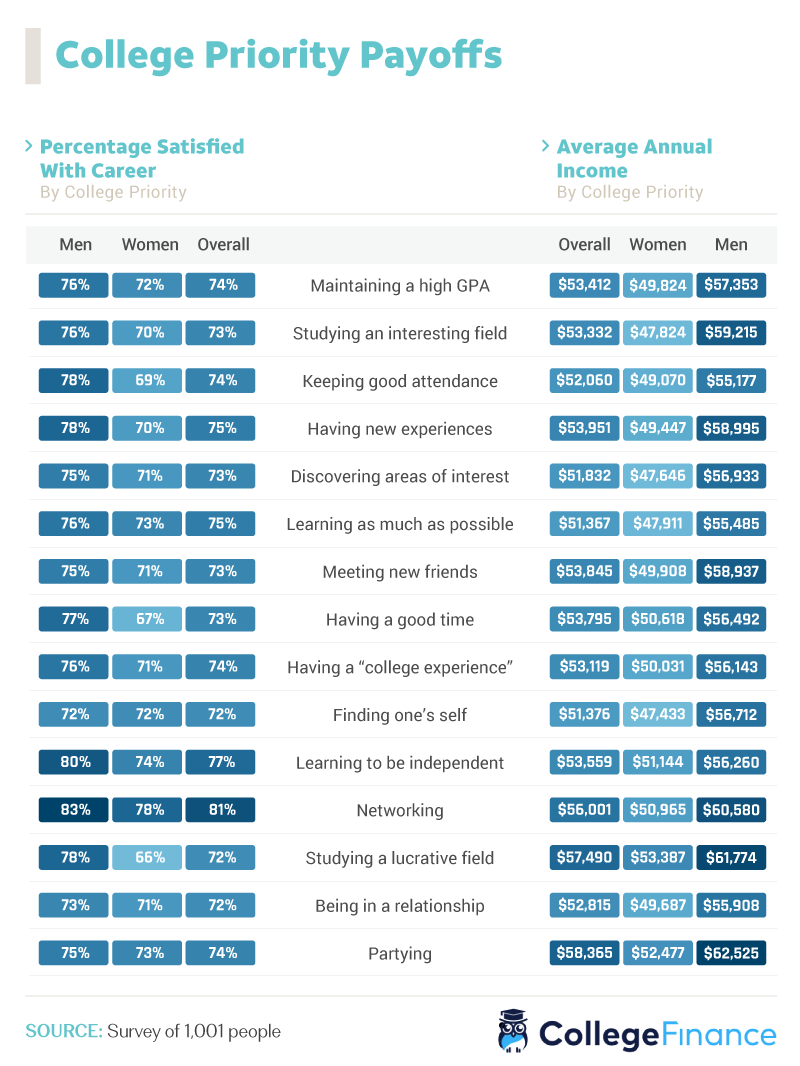
In terms of certain life outcomes, however, academic achievement seemed less significant than other priorities. While just 32% of respondents prioritized networking in college, this group was most likely to report satisfaction with their careers. This group also reported high earnings on average. Similarly, those who prioritized learning to be independent reported higher career satisfaction and income on average.
Additionally, one data point is sure to disturb parents everywhere: individuals who prioritized partying in college actually had the highest earnings, on average, surpassing even those who prioritized lucrative careers. Perhaps this speaks to a positive trajectory: Even for those who are wild in college, a stable career path may await.
Looking Forward
Many college students find themselves torn between two perspectives: To savor the present while in college or focus on preparing for their future success. To explore this conflict in more detail, we studied how things worked out for people who chose each path.
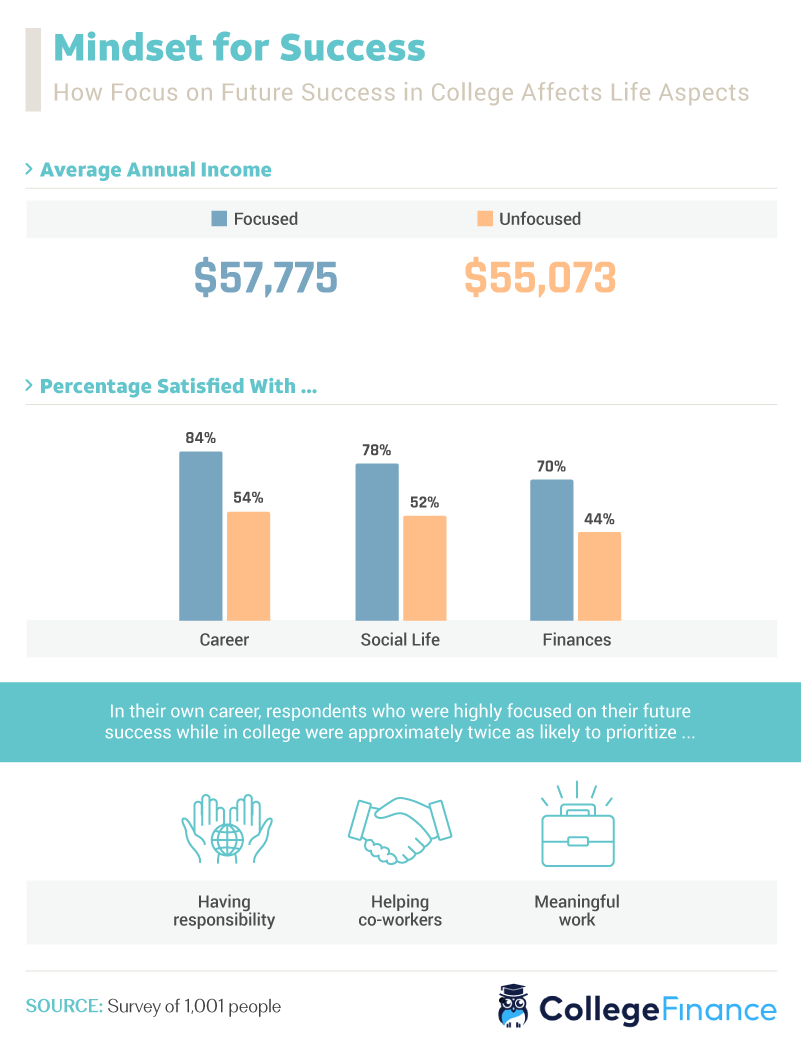
On average, people who focused on the future while in college earned about $2,700 more per year than their unfocused counterparts. But this earnings contrast was just one of several differences surfaced by this comparison. Indeed, those who kept their eyes on the future in college reported greater satisfaction in several important areas of their life.
First, people who focused on the future in college were significantly more likely to feel satisfied with their careers. This could reflect the importance of career planning in college: Many students neglect to utilize valuable campus resources, such as career centers and job fairs.
On the other hand, this finding could also reflect this group’s current professional values. Compared to those who had been unfocused in college, the future-oriented crowd were twice as likely to prioritize certain values in their current roles. These included having responsibility, helping co-workers, and performing meaningful work.
In a similar vein, focused college students were far more likely to feel satisfied with their finances and social life in the present. Cumulatively, these findings indicate that focusing on the future may set college students on the path to fulfilling lives, though looking forward hardly stops once they leave school.
Work, Life, Balance?
After exploring our respondents’ experiences in college, we also examined their current professional values. Studying what they prioritized in their careers, we analyzed which priorities corresponded to greater satisfaction and earnings.
Top 15 Most Common Career Priorities
- Work-life balance – 67%
- Enjoyable work – 62%
- Job security – 58%
- Good benefits – 57 %
- Happiness at work – 57%
- Meaningful work – 55%
- Flexible hours – 48%
- High salary – 44%
- Career growth – 44%
- Avoiding stress – 37%
- Coworker relationships – 36%
- Having responsibility – 30%
- Recognition – 25%
- Assisting coworkers – 21%
- Networking – 19%
Among men and women alike, the most common priority was work-life balance – an elusive ideal in the modern professional world. Other top priorities included enjoyable work and job security. Women were more likely to prioritize these intangible aspects, whereas men were more likely to prioritize high salaries and low stress.
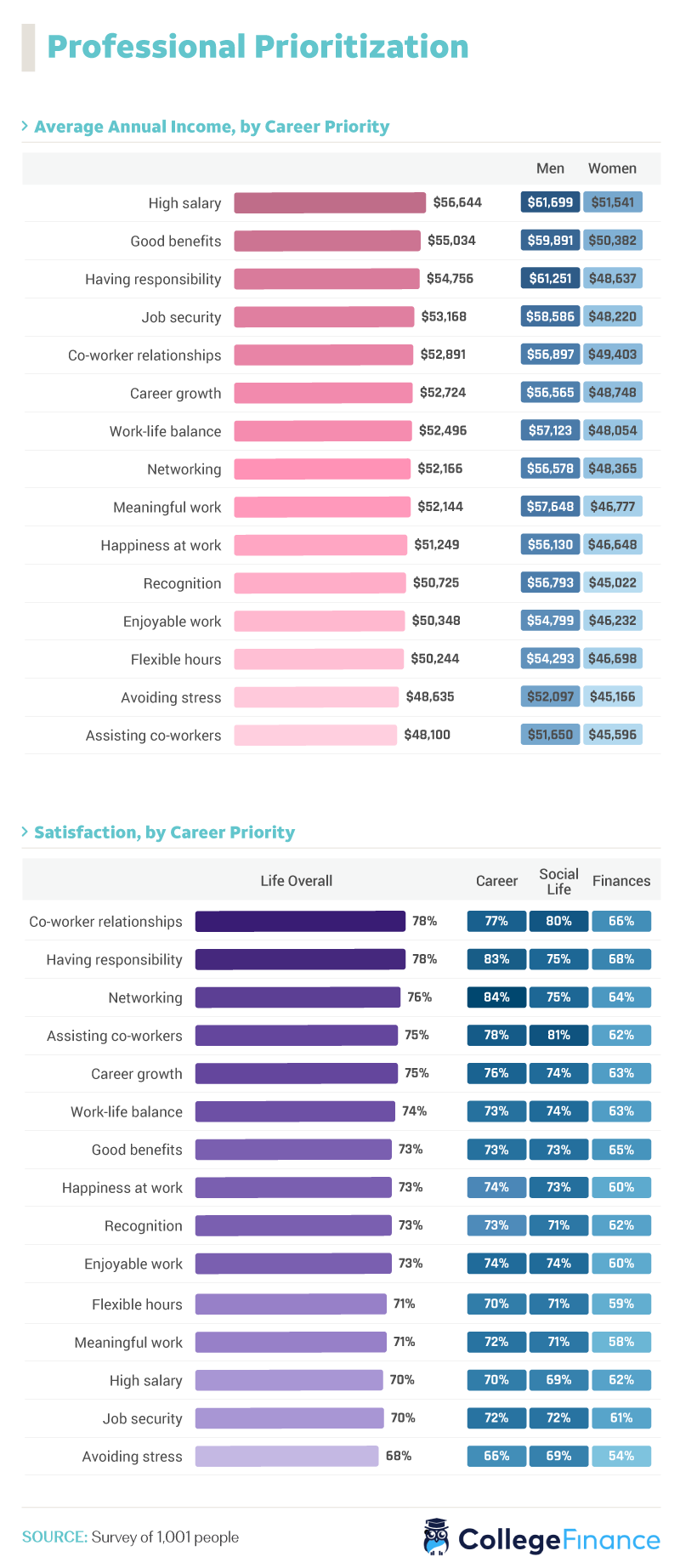
In terms of income, certain priorities did translate to greater earnings: People who prioritized high salaries earned the most on average, followed by those who prioritized good benefits. Unfortunately, our results demonstrate the persistence of the gender pay gap: Regardless of what they prioritized, female respondents reported lower salaries than men.
Interestingly, people who prioritized co-worker relationships and responsibility at work enjoyed the greatest life satisfaction on average. The former corresponded particularly to social life satisfaction, whereas the latter was aligned with career and financial satisfaction instead.
The theme of professional relationships surfaced repeatedly, as networking and assisting co-workers also correlated with high rates of life satisfaction. These findings resonate with existing research suggesting that strong bonds with colleagues are essential to happiness inside and outside of work.
Appreciating Intangibles
Just like college, our careers present challenging choices and competing priorities. When it comes to these tough trade-offs, where do most professionals stand?
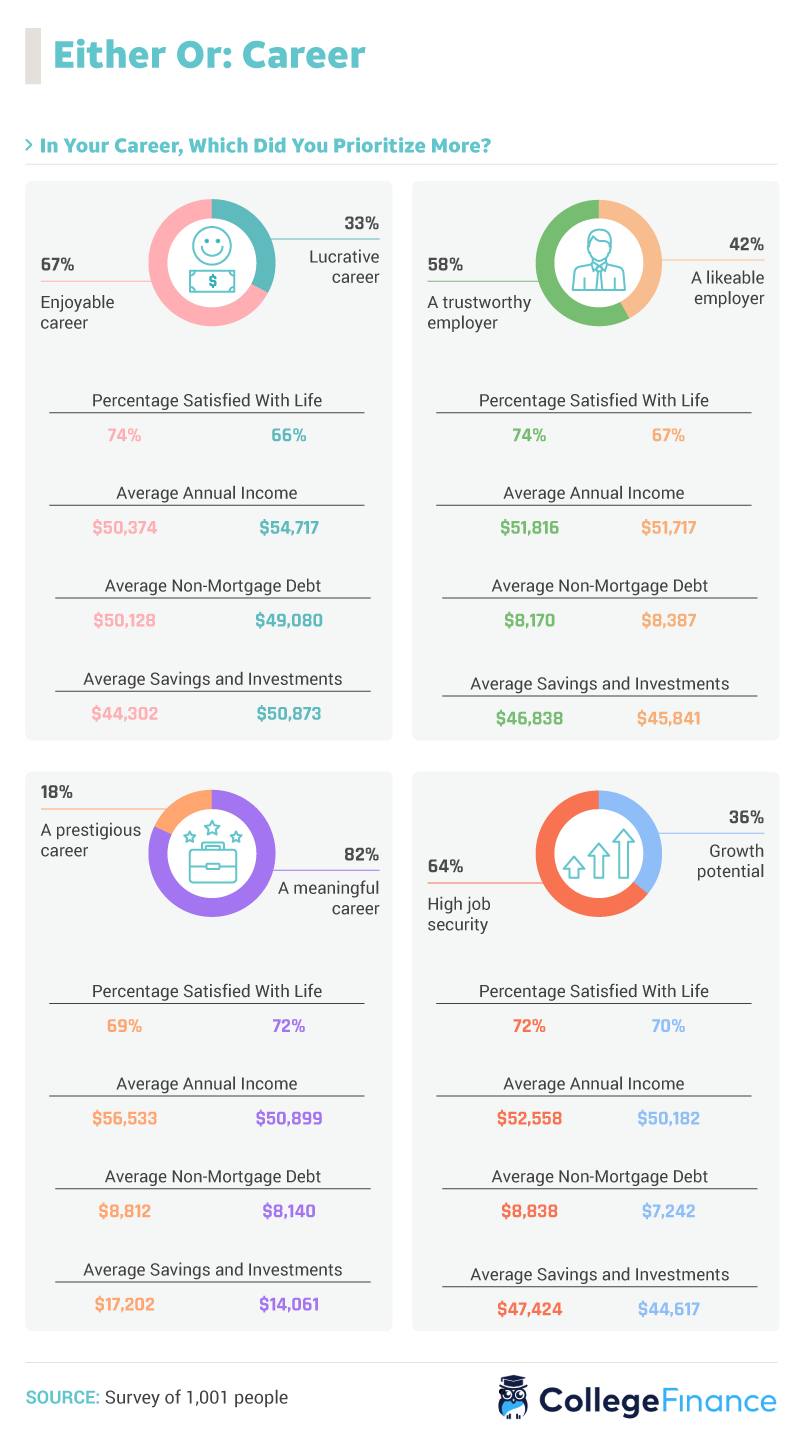
For example, two-thirds of respondents said they prioritized enjoying their careers over making money. And while the minority that prioritized money did have more impressive earnings, those who emphasized career enjoyment were more likely to be satisfied with their life.
This statistic may reflect the arrival of millennial values: This generation desires “fun” at work much more than their elders did. Similarly, the vast majority of respondents prioritized meaningful careers over prestigious ones. According to experts, millennials have ushered in this shift in perspective within the American workforce, which has caused companies to shift their approaches as a result.
Additionally, respondents were more likely to prioritize having a trustworthy employer over one they liked personally. While workers don’t need to love your company’s leaders, trust is essential to sustaining employee morale and loyalty. On a related note, workers were also more likely to prioritize job security over high growth potential. For most professionals, it seems, the daily serenity of having a solid job is more important than possible advancement.
Your Priorities: Planning With Purpose
In some ways, our findings call some of higher education’s core narratives into question. After all, much to the horror of college administrators everywhere, those who prioritized partying tended to earn more money. Similarly, those who prioritized academics in college were no more satisfied in the long run. With results like these, students certainly might be tempted to let their studies slide.
But our findings also suggest that we should expand our views of adult success. For the vast majority of professionals, finding enjoyment and meaning in their work was far more important than money or prestige. Additionally, the most common work priority was work-life balance, while earnings and recognition were much further down the list.
Perhaps the best college experiences prepare us to honor these values, allowing us to learn what matters most. While achievement and partying both have attractive elements, neither is a formula for finding the good life.
Whether you’re currently in college or well-established in your career, CollegeFinance.com can help you make smart choices to secure your financial future. By approaching your student debt strategically, you’ll find the freedom to work and live however you choose. Check out our resources today to see how we can help.
Methodology and Limitations
We surveyed 1,001 people using Amazon MTurk. 514 respondents were men, 484 respondents were women, and 3 respondents did not identify as male or female. Our respondents ranged in age from 18 to 89 with an average age of approximately 38. To help ensure that respondents took our study seriously, all respondents were required to identify and correctly answer an attention-check question.
In some cases, questions and responses were rephrased for clarity or brevity. In certain cases, outliers have been excluded. These data rely on self-reporting, and statistical testing was not performed on these findings. Potential issues with self-reported data include, but are not limited to, exaggeration, selective memory, and attribution errors on the part of respondents.
Fair Use Statement
We hope you’ll share this project with someone who might be interested in our findings, whether they’re a college student in search of inspiration or a professional facing tough career choices. If you do choose to share our work, please include a link back to this page to attribute our team appropriately. Please also use our information and images exclusively for noncommercial purposes.


